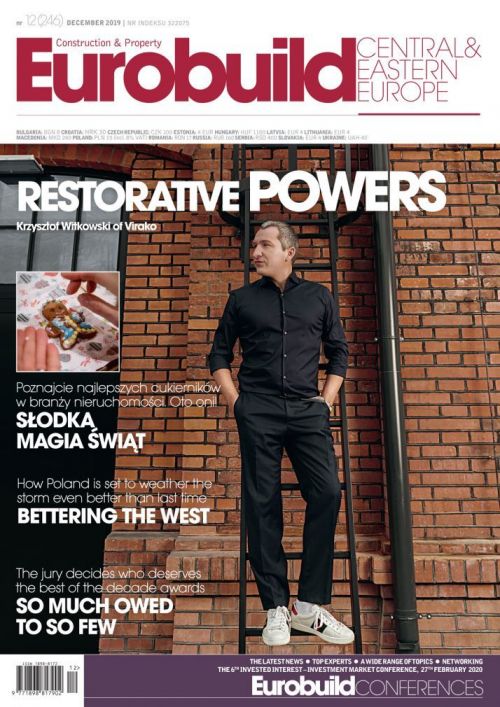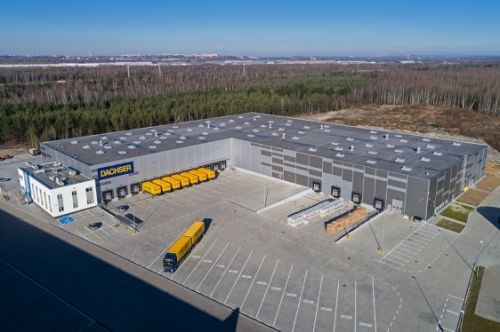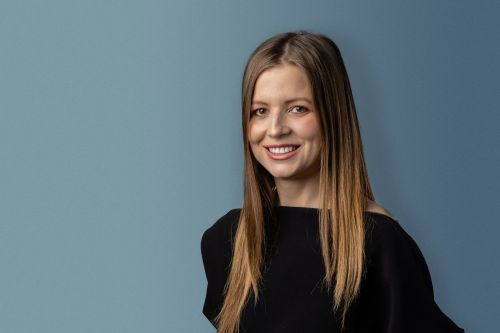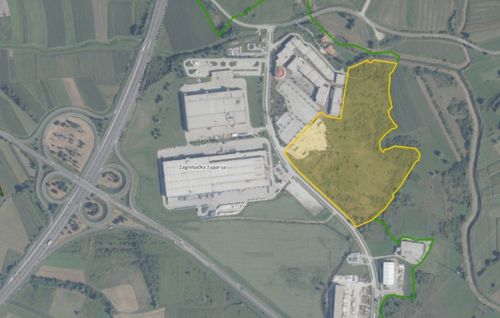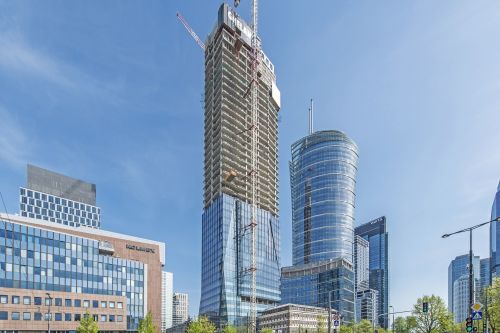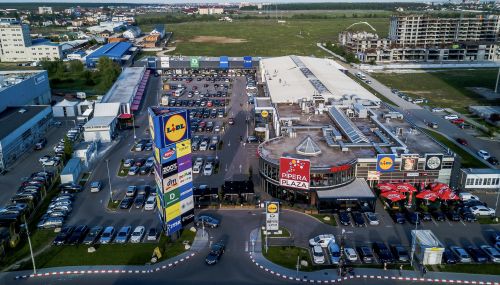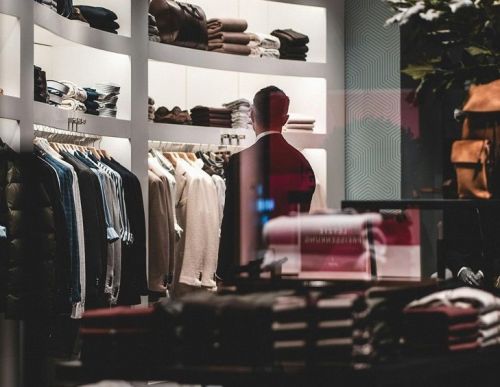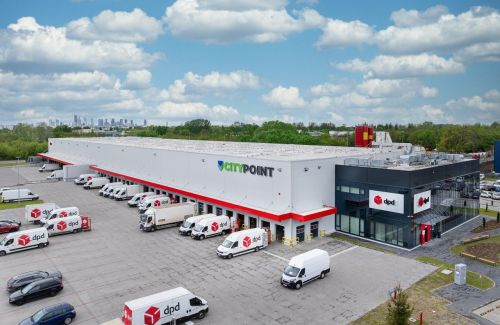Restorative powers
Feature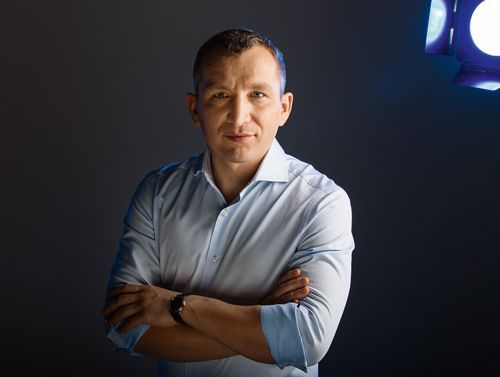
Tomasz Szpyt-Grzegórski, ‘Eurobuild CEE’: How did it all start for you?
Krzysztof Witkowski, CEO, Virako: My passion originally sprang from the very basic renovation work I was involved in during my construction studies. I combined my studies with working in my mother’s company. We bought small factories built in the 1970s and converted them into small offices and warehouses.
Why was a first-year student interested in old factories?
Chance always plays a part in anyone’s life. Many old industrial buildings in Łódź were derelict at that time, and as chance would have it my mother decided to invest in real estate and bought some former production plants. I became totally involved in this – from the construction work to securing the tenants. And this is how my adventures in revitalisation began. It continues to this day, only on an entirely different scale and in a different market and business environment.
So what was your first major project?
My first major challenge and real revitalisation in the full sense of the word was the Faktoria project on ul. Dowborczyków in Łódź. In 1999, we bought the former Henryk Wegner factory, which was built in 1924 and produced engines to power looms. The property was in a bad state so we started the renovation work immediately. In retrospect and with the experience we now have, I’m convinced that we would probably do it very differently today, as we faced many problems at the time, which were mostly due to the economic situation. Łódź is a great city but it has been very battered by modern history. Almost all of its production plants closed down during the economic and political upheaval after 1989. Then conditions started to improve – small textile workshops were set up and trade with Russia grew. However, the introduction of visas for Russians in 2003 finally killed off the light industry that then dominated in Łódź and led to a second economic crisis for the city. This was when we entered the market, when the textile industry was declining and there was an urgent need to find a new use for old walls. I came up with the idea of turning the Wegner factory into office lofts. Faktoria was actually one of the first revitalisations, not only in the city but also in the entire country. We started with the factory building and neighbouring facilities and then constructed an outbuilding. We finished the project in 2006, creating a conference zone and a restaurant along with the offices. And the project turned out to be a hit. That was also when I began to read Eurobuild. There was no other place to go to to learn about professional real estate development – so I started going to your conferences and drew further inspiration for my work.
How did you raise the funds for your early projects?
Virako is a family business – and has grown organically. My mother invested in our first properties while I built the development side of the company from scratch. It was from her that I learned how to run a business, talk to people, deal with the pressure of the environment, but most of all how to show respect for partners and co-workers. My business partner Tomasz Kona joined Virako a few years ago and is now a pillar of the company.
What was the office market in Łódź like twenty years ago?
At that time, ul. Piotrkowska was the only important street in the cityand was extremely popular. If you were anyone in Łódź, then you had to have an office there. This represented a huge challenge for us, since ul. Dowborczyków – the location of Faktoria – is three side streets away. This might seem close, but it’s in a place that wasn’t previously regarded as a business zone. It was also a time when new sectors were replacing light industry – accountancy offices, insurance and telecommunications companies were being set uo. So there was the potential for development.
Faktoria was leased out and sold. How did you convince tenants to move into an old factory?
Many companies at that time were opening offices on ul. Piotrkowska. It’s a great location with impressive historic architecture, but the standard of these often superficially renovated tenement houses left much to be desired. There were no parking spaces, either. At Faktoria we created something of quality that was new – a professionally managed, modern office complex in the full sense of the term, with a reception, conference space, a restaurant, and a secure car park. Companies then started to relocate from ul. Piotrkowska to ul. Dowborczyków. We had been successful but we needed to understand the market and open ourselves up to new concepts. Things were similar in the case of…
... Forum 76?
For the international companies we wanted to work with, Faktoria still didn’t provide the highest standard they required in their preferred location. Corporations considered it important for the office building to be located on a main street, to give them greater exposure. The Forum 76 project originated out of this need and our faith in the business potential of Łódź. It was the first class ‘A’ office building in the city. There was quite a bit of scepticism regarding the demand for modern space in the city at that time. However, it turned out that I was right.
However, there was another economic crisis before the building was completed and sold. How did this affect the company’s operations?
Forum 76 was 40 pct leased at the beginning of the construction. After it was completed in 2009 – despite the scale of the credit crunch – the leasing level reached around 65 pct and in the following year companies willing to rent the rest appeared. The office building itself has been awarded twice by its tenants with the prize for the best office building in Poland at the Eurobuild Awards.
And a few years later, in 2016, a buyer for the building appeared.
The sale of Forum 76 was one of the first deals of its kind in the city. It provided us with the opportunity to carry out our flagship project – Monopolis.
But it still took investors quite a long time to become convinced about Łódź.
Indeed, but we don’t operate in such a way that we sell our buildings immediately after their construction and leasing. We gain experience from running the office building and learn about tenants’ needs. Such knowledge has paid off in subsequent projects. It will be similar with Monopolis – we have no plans to sell it immediately, we only want to manage the project for a time. The second issue is how Łódź is perceived. Foreign investors even had a problem finding it on the map ten years ago. The city was unknown on international markets.
When did this change?
The change in perception came in around 2014–2016. The first two deals – the sale of Green Horizon and Forum 76 – were breakthroughs. Real estate investors as well as international developers then entered Łódź, which at the time was dominated by local businesses. The increasing market saturation and low supply of product in major regional cities helped to create the perfect environment for us. At the same time, it must be stressed what a huge amount of work the city authorities has done. The launch and promotion of such spectacular projects as the Łódź Fabryczna station, EC1 and Nowe Centrum Łodzi as well as the comprehensive city centre revitalisation programme, started to have measurable results. There was also the marketing campaign for Expo 22 – another sign of the growing investment and tourist attractiveness of the city. So there has recently been a profound change in its business image.
What are the prospects for Łódź for the next few years?
The city’s office stock has this year exceeded 0.5 mln sqm. New factories and logistics centres are being developed; we will soon be the first city in Poland to have a complete orbital motorway ring road. The tunnel connection for the Łódź Kaliska and Łódź Fabryczna stations will provide the city with a railway hub. The New Central Polish Airport could also be important for the city’s development. Revitalisation projects are being carried out at the same time. If these plans work out, a transformed and beautiful Łódź will be a major location on the business and tourist map of Poland in the next 5–10 years. However, the greatest resource of the city has always been its people – they are open, creative and highly entrepreneurial.
The future looks rosy, but let’s get back to the recent history – how did the decision to buy an old vodka distillery in the city arise?
Forum 76, which also houses the headquarters of Virako, is next to a former vodka distillery. Over the years, we were waiting for these impressive historic buildings to find a buyer. At the same time, we became more and more involved in the office sector and saw a new generation of employees enter the market, the evolution of working styles and thus a change in the expectations regarding business space. We came to the conclusion that we need to provide distinctive office space that meets the expectations of modern companies and young people. We had been considering taking on this project for a long time – the first few concepts were drawn up in 2011, but the final decision was made two years later. Bear in mind that there were no projects in the city like Koneser or Elektrownia Powiśle that Warsaw had at that time. It was therefore a bold move on our part – based on our business assessments, but not only that. Monopolis was conceived as a way of rebuilding the neighbourhood and bringing added value to city’s social and cultural life. This is the quintessence of Virako’s twenty years of operations in a business, social and cultural sense – a reflection of the experience we have gained over this time. We are just finishing the first stage of the project and the first few office tenants have been moving in, with more to follow in Q1 2020. In the spring we will open the cultural and catering section consisting of restaurants that will serve a variety of cuisines, a café, a bakery, a theatre, a children’s club, an art gallery and a museum. The restaurant and service sections are currently 70 pct leased, but we have no plans to lease the entire space before the opening. We will leave some units for rent after the opening just to see what services and amenities should be added to the project once it’s in operation. We want to respond to the needs of tenants on an ongoing basis and create this project together with them. However, the office part is now 85 pct leased. We have also started the leasing of the second stage.
When will the second stage be launched?
We underground car park for the second stage has already been built. We will be starting the construction of the 10,000 sqm tower in Q1 2020 and for this we are currently looking for a general contractor. We should complete it after a year and then start the final stage of Monopolis – another 10,000 sqm. Its construction should take around a year and a half.
What kind of future projects does Virako have in mind?
I can only say for now that they will be built around the city’s historical fabric.
Would this be on the same scale as Monopolis?
Similar, but slightly smaller. We have been growing organically, with quality rather than quantity being our priority.
Is there any chance that you might invest in another city?
We have some ideas and I think Virako is going to venture outside Łódź one day.
Which way?
The TriCity seems to be an interesting direction.
In addition to real estate development, Virako is also involved in property management.
We are the manager of Forum 76 and intend to manage Monopolis. We take this task very seriously, botha as an important experience and as a business. However, we are not jsut limited to business.
Are you talking about the Virako foundation?
Yes, I am. We set up our Szczęśliwe Podwórka [Happy Backyards] foundation ten years ago and run a community centre working with professional psychologists and sociotherapists. This now supports about thirty children, often from dysfunctional families. We want to show these kids that the real world can be different from the one they have known, and that studying and hard work make sense and will pay off in the future.
Renovation specialist
Krzysztof Witkowski is the founder and CEO of Virako – a Łódź-based development company that has been operating in the city since 2000. He was one of the first people in Poland to take on the renovation of former factory buildings with the loom engine factory built in the 1920s by Henryk Wegner factory, which was converted into office lofts. He has also developed the Forum 76 Business Centre – the first class ‘A’ office building in Łódź. This was the winner of the Construction Project of the Year 2009 awarded by Polska Izba Inżynierów Budownictwa, it was also judged to be the Best Office Building in Poland in 2012 and 2014 at the Eurobuild Awards. His latest project is Monopolis, the redevelopment of the former Monopol Wódczany vodka distillery complex, which dates back to 1902 and is the third largest factory complex in Łódź.
As the CEO of a socially responsible company, Krzysztof is involved with charities to help children and young people. He is the organiser behind the Szczęśliwe Podwórka campaign, which helps set up and operate community centres.
























